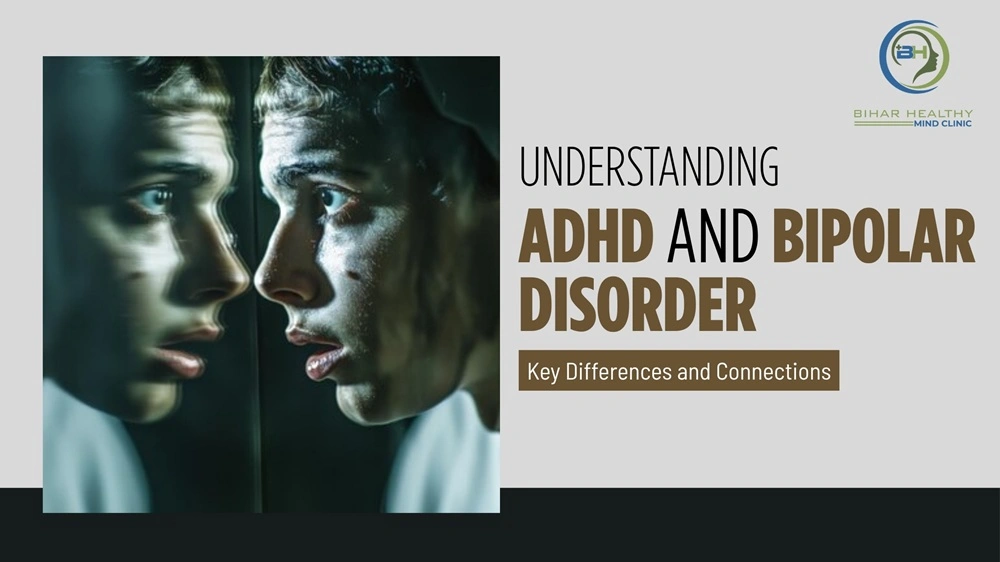
Mental health conditions can often share overlapping symptoms, making it difficult for individuals to recognize where one disorder ends and another begins. Among the most commonly confused are ADHD and Bipolar Disorder. Both affect mood, energy, and concentration, but their underlying mechanisms and treatment approaches differ significantly.
At Patna Psychiatry, patients receive precise diagnoses and comprehensive care for challenging mental health conditions such as ADHD and Bipolar Disorder, guided by the expertise of Dr. Saurabh Kumar, MD (Psychiatry), recognized as one of the best psychiatrists in Patna. This blog explores how these disorders differ, their connection, and the right approach to diagnosis and care.
What is ADHD (Attention Deficit Hyperactivity Disorder)?
ADHD is a neurodevelopmental condition that usually starts in childhood and may continue to affect individuals well into adulthood. It affects attention span, self-control, and executive functioning - skills necessary for organization and focus.
-
Common Symptoms of ADHD:
- Inattention: Difficulty maintaining focus or following through on tasks.
- Hyperactivity: Restlessness, constant movement, or difficulty sitting still.
- Impulsivity: Acting without considering consequences.
While many assume ADHD only affects children, adults often continue to face challenges in work performance, relationships, and time management. Proper diagnosis by a psychiatrist helps differentiate ADHD from mood disorders that may appear similar.
What is Bipolar Disorder?
Bipolar Disorder is a mood disorder characterized by intense emotional highs (mania or hypomania) and lows (depression). These mood shifts are not just temporary; they significantly impact daily functioning and quality of life.
-
Common Symptoms of Bipolar Disorder:
- Manic or Hypomanic Episodes: Increased energy, euphoria, irritability, impulsivity, or risky behavior.
- Depressive Episodes: Sadness, fatigue, loss of interest, and sleep or appetite changes.
- Mixed Episodes: A combination of manic and depressive symptoms occurring simultaneously.
Early intervention is crucial, as untreated bipolar disorder can lead to complications such as relationship problems, substance abuse, or suicidal tendencies.
ADHD and Bipolar Disorder: Why They’re Often Confused
Both ADHD and Bipolar Disorder can cause impulsivity, distractibility, and mood instability, leading to frequent misdiagnosis. However, the pattern and duration of symptoms help psychiatrists differentiate them.
- ADHD symptoms are chronic and present from an early age.
- Bipolar Disorder symptoms are episodic, appearing as cycles of mania and depression.
For example, while a person with ADHD may struggle with consistent inattentiveness, someone with bipolar disorder may display high productivity during manic phases followed by extreme fatigue or hopelessness during depressive episodes.
An accurate evaluation from a mental health expert like Dr. Saurabh Kumar at Patna Psychiatry ensures that patients receive the right diagnosis and avoid inappropriate treatment strategies.
The Connection Between ADHD and Bipolar Disorder
Recent research suggests that ADHD and Bipolar Disorder can coexist in some individuals, a condition known as comorbidity. Studies show that nearly 20% of adults with ADHD may also experience bipolar symptoms.
-
Shared Features Include:
- Impulsivity and risk-taking behavior.
- Emotional dysregulation and irritability.
- Difficulty maintaining focus or motivation.
However, the origin of these symptoms differs. ADHD stems from impaired attention control and executive functioning, while bipolar disorder involves abnormal mood regulation within the brain’s emotional centers.
Understanding this relationship helps psychiatrists customize treatment to manage both conditions effectively without aggravating one while treating the other.
Diagnosing ADHD and Bipolar Disorder
Diagnosis involves a comprehensive psychiatric evaluation that considers symptom history, family background, and psychological testing.
-
Key Diagnostic Steps Include:
- Detailed patient history covering childhood behavior and mood patterns.
- Assessment of manic or depressive episodes.
- Neuropsychological testing for attention and focus.
- Evaluation of medication responses, if any.
At Patna Psychiatry, diagnosis is handled with precision and empathy, ensuring each patient receives an individualized care plan that considers both biological and psychological aspects.
Treatment Approaches for ADHD and Bipolar Disorder
Treatment strategies differ for both conditions, although they may overlap in certain areas like lifestyle management and therapy.
1. ADHD Treatment:
- Medications: Stimulants and non-stimulants to improve focus and attention.
- Behavioral Therapy: Helps manage impulsivity and develop organizational skills.
- Lifestyle Changes: Regular sleep, exercise, and structured routines.
2. Bipolar Disorder Treatment:
- Mood Stabilizers: To balance manic and depressive episodes.
- Psychotherapy: Cognitive Behavioral Therapy (CBT) to identify mood triggers.
- Medication Management: Ensuring antidepressants or stimulants do not trigger manic symptoms.
When both disorders coexist, treatment must be carefully balanced. Medications for ADHD might worsen manic symptoms, so psychiatrists adjust dosages or select alternative therapies accordingly.
Living with ADHD and Bipolar Disorder
Living with either or both conditions requires consistent psychiatric care, self-awareness, and support. Patients benefit from learning coping skills such as mindfulness, journaling, and structured goal-setting. Family education is equally vital, as it fosters understanding and reduces stigma.
At Patna Psychiatry, Dr. Saurabh Kumar and his team provide compassionate care aimed at improving long-term mental well-being. His holistic approach combines medical expertise with psychological support, making him one of the best psychiatrists in Patna for complex psychiatric cases like ADHD and Bipolar Disorder.
Conclusion
Although ADHD and Bipolar Disorder share some overlapping features, their causes, symptom timelines, and treatment approaches differ. Accurate diagnosis is key to successful management.
For individuals struggling with persistent mood swings, inattentiveness, or impulsive behavior, consulting a qualified specialist is the first step toward recovery.
If you or a loved one experiences these symptoms, reach out to Patna Psychiatry, where Dr. Saurabh Kumar, MD (Psychiatry) offers expert evaluation and evidence-based treatment tailored to your needs.
Visitors: 97





No comments yet.